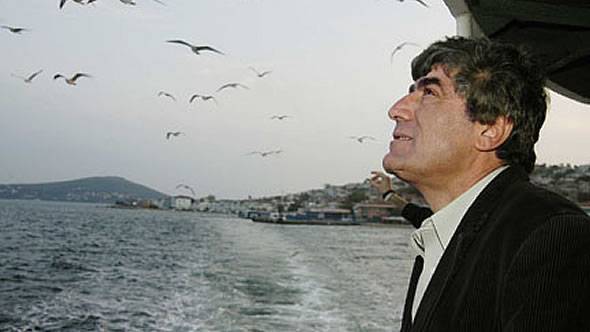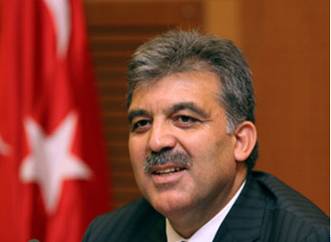Turkey's friends and the international debate on the Armenian Genocide
 |
|
Hrant Dink. Photo: tog.org |
"I challenge the accepted version of history, because I do not write about things in black and white. People here are used to black and white; that's why they are astonished that there are other shades, too."
Dear friends of ESI,
As part of our Caucasus Project ESI in April 2009 published the report "Noah's Dove Returns" on Turkish-Armenian relations. In June we followed up with an opinion piece Red herrings in Turkish-Armenian Debate.
In these publications we made five main arguments. Turkish "genocide diplomacy", pursued since the early 1980s, has failed and is hurting Turkish interests; refering to 1915 as a genocide does not single out Turkey; international genocide resolutions do not throw into question the current Turkish-Armenian border; they do not pave the way for compensation claims against the Turkish state; and the passage of genocide resolutions has actually coincided with rising respect for Turkey's role in the world.
In light of rising tensions between Turkey and some of its closest allies, such as the US and now Sweden, these arguments appear to be more relevant than ever. On 4 March the Foreign Affairs Committee of the US House of Representatives passed non-binding Resolution 252, with a narrow margin of 23 votes in favor and 22 votes against. The resolution
"(1) calls upon the President to ensure that the foreign policy of the United States reflects appropriate understanding and sensitivity concerning issues related to human rights, ethnic cleansing, and genocide documented in the United States record relating to the Armenian Genocide and the consequences of the failure to realize a just resolution; and
(2) calls upon the President in the President's annual message commemorating the Armenian Genocide issued on or about April 24, to accurately characterize the systematic and deliberate annihilation of 1,500,000 Armenians as genocide and to recall the proud history of United States intervention in opposition to the Armenian Genocide."
In response to this Turkey withdrew its ambassador and Turkish politicians and opinion makers warned of grave consequences.
On 11 March the Swedish Parliament likewise passed a resolution on the Armenian genocide with 131 votes against 130. Turkey again withdrew its ambassador and the prime minister cancelled a planned visit to Stockholm.
Let us look at each of the arguments we made last year in light of recent events.
1. Turkish genocide diplomacy is failing.
In 2009 we wrote that Turkey "continues to invest considerable political capital in resisting international recognition of the Armenian genocide. Yet this is a battle that Turkey cannot win."
This is even more obvious today.
Since 1999 Sweden has been one of Turkey's staunchest supporters inside the European Union. All parties in the Swedish parliament support further EU enlargement and Turkish accession (see also The Stockholm consensus on EU enlargement). Why then has a majority of Swedish parliamentarians ignored Turkish warnings (and the recommendations of the Swedish government) and recognized the Armenian genocide by a vote of 131 to 130 this week?
In fact, the Swedish case is far from exceptional. Poland, a traditional ally of Turkey in Europe and an advocate of further enlargement has recognized the Armenian genocide. So has the Netherlands, under whose EU presidency Turkey was given the date for EU accession talks. So have Turkey's friends in Germany at the time of the Red-Green coalition under Chancellor Gerhard Schroeder.
 |
|
A friend of Turkey. Photo: SPD |
On 21 April 2005, the German social democratic parliamentarian Gernot Erler made a press statement on behalf of his parliamentary group, suggesting that "the Bundestag acknowledges German joint responsibility in this genocide." A number of other MPs spoke of 'genocide'. On 16 June 2005, the Bundestag unanimously adopted a motion, tabled jointly by the SPD, CDU/CSU, Alliance 90/Greens and the FDP:
"The German Bundestag … deplores the deeds of the Young Turks government of the Ottoman Empire, which led to the almost total annihilation of the Armenians in Anatolia. … Numerous independent historians, parliaments and international organizations qualified the deportation and extermination of Armenians as genocide."
These resolutions cannot be explained by Armenian lobbying or by any anti-Turkish sentiment. Genocide resolutions have been passed in countries with small Armenian populations – in Poland, in Italy, in Lithuania and in Slovakia. The Netherlands is home to one of the largest Turkish communities in Europe. Germany has the EU's largest Turkish population. The Red-Green coalition in Berlin had pushed for Turkey to become an EU candidate in 1999; in 2000, it amended the German citizenship law to make it easier for hundreds of thousands of long-time Turkish residents to become German citizens (and thus voters); in 2004, it strongly supported opening accession talks with Ankara.
To be a friend of Turkey and to recognize the Armenian genocide have not been contradictory in the past decade. It is important that this is recognized also in the Turkish domestic debate.
Turkey is also losing its battle in the US. Following the latest US elections, all the key figures in the new administration – President Barack Obama himself, Vice President Joe Biden, Secretary of State Hillary Clinton – are on record calling the 1915 events a genocide.
Visiting Ankara in April 2009 with the intention to launch a new era in US-Turkish relations, Obama told journalists that his views on the Armenian genocide "had not changed and were on the record." It is only a question of time before Obama and others in his administration reaffirm what they have already stated repeatedly. To date, 42 out of 50 US states representing 85 percent of the US population, have, by legislation or proclamation, recognized the Armenian Genocide.
 |
|
US President Barack Obama speaking to the Turkish Parliament on 6 April 2009. |
2. Refering to 1915 as genocide does not single out Turkey
Genocide studies have by no means "singled out the Turks", as some Turkish critics have suggested. On the contrary, research has made it clear that the 20th century – probably the most violent in human history – saw genocide take place in almost every corner of the world. The most relevant comparisons to the Armenian case are the genocide committed against the Herero by Germany in 1904 and the genocide committed against Bosnian Muslims in Srebrenica.
Scholarly journals such as Holocaust and Genocide Studies and the Journal of Genocide Research now feature articles on genocide committed by the ancient Roman Republic, on Russian atrocities against Muslims in the Northern Caucasus, on genocides in Cambodia, Rwanda, East Timor, Burundi, Guatemala, native Americans in Spanish America, Ukraine (under Stalin) and Bosnia. Scholars tell the story of "genocidal death marches, most infamously the Trail of Tears of the Cherokee and Navajo nations, which killed between 20 and 40 percent of the targeted populations en route" in the US and discuss the tragic fate of the Aborigines in Australia.
Until 1980, genocide research had focused mainly on the Holocaust. Turkish scholars rejected the genocide label by emphasising the difference between Hitler's policies and those of the Young Turk government. They made two claims. First, unlike the Holocaust, it was impossible to establish the "intent to destroy" the Armenians on the part of the Ottoman authorities, given that important Armenian populations in parts of Turkey were untouched (an argument made also by US historian Guenther Lewy). The second proposition is that, unlike the Jews of Nazi Germany, the Armenians had rebelled against the Ottoman authorities, and therefore could not be counted as "innocent victims".
However, in recent international usage the term "genocide" is not limited to "acts equivalent to the Holocaust". When Hutu apologists claimed that the 1994 Rwandan genocide was a continuation of civil war, and a defensive act intended to pre-empt genocide at Tutsi hands (which Hutus had suffered in neighbouring Burundi in 1972), the International Criminal Tribunal for Rwanda rejected the argument.
 |
|
A genocide against Balkan Muslims: Srebrenica 1995 |
In 2003 Dutch expert Ton Zwaan, asked by the prosecutor of the International Criminal Tribunal for the Former Yugoslavia (ICTY), argued that the Holocaust should not obscure recognition of other, less 'total' forms of genocide. The Guatemalan Historical Clarification Commission, looking into the atrocities of the 1970s and 1980s against indigenous Mayans, concluded that "agents of the State of Guatemala, within the framework of counterinsurgency operations carried out between 1981 and 1983, committed acts of genocide against groups of Mayan people." The 1995 Srebrenica massacre in Bosnia-Herzegovina, in which Bosnian Serb forces killed some 8,000 Muslim men, was found to be genocide. In a 2004 judgment, the International Criminal Tribunal for the Former Yugoslavia (ICTY) concluded that "… given the patriarchal character of the Bosnian Muslim society in Srebrenica, the destruction of such a sizeable number of men would inevitably result in the physical disappearance of the Bosnian Muslim population at Srebrenica."
3. International genocide resolutions do not throw into question the current Turkish-Armenian border.
The question of territorial claims is a red herring in the recognition debate. Though it has been on the agenda of a vocal nationalist minority in Armenia (and in the Diaspora) for decades, border revision has never been part of any Armenian government's policy. Armenian nationalists' claims, based on the never-ratified Treaty of Sevres, have not managed to secure any international support. Normalization of ties between Turkey and Armenia, in any case, would put them to rest once and for all. This, in fact, is exactly why some Armenian nationalists have second thoughts about establishing relations with Turkey.
4. International genocide resolutions do not pave the way for compensation and restitution claims against the Turkish state.
The argument that recognition, be it by countries in the EU or the US, will allow Armenians to sue the Turkish government – is widespread in Turkey. It is also false. The Armenian genocide has been officially recognized by more than 20 countries: if recognition would pave the way towards restitution, these countries' courts must surely be flooded with Armenian lawsuits? In fact, not a single genocide-related claim has successfully been made against the Turkish government anywhere in the world – this, despite genocide resolutions having been passed in countries like France, Germany and Russia. In Red Herrings we argued that:
"there is no connection whatsoever between genocide recognition on the one hand and property restitution or compensation claims on the other. There is no slippery slope leading from a non-binding US Congressional resolution to a successful lawsuit against the Turkish state to the confiscation of Turkish airlines planes at American airports. Turkish decision makers and opinion leaders should make it clear that such fears are another red herring."
The jurisprudence of the European Court of Human Rights in the area of property restitution makes it clear that Armenians could pursue compensation or restitution claims only if the Turkish state were to establish a legal base allowing them to do so. An International Center for Transitional Justice (ICTJ) study in 2002 – is just as unambiguous on the issue. Although the events of 1915 had "all the elements of genocide" ICTJ concluded that "no legal, financial or territorial claim arising out of the Events could successfully be made against any individual or state under the Convention." The European Parliament recognized in an 18 June 1987 resolution "that the present Turkey cannot be held responsible for the tragedy experienced by the Armenians of the Ottoman Empire and stresses that neither political nor legal or material claims against present-day Turkey can be derived from the recognition of this historical event as an act of genocide."
Over the past few years, a number of insurance companies have had to pay compensation to those Armenians whose relatives, having purchased insurance policies before 1915, perished in the genocide. But it was the companies themselves – and not the Turkish government – who were the defendants in these cases. The claims had nothing to do with the Turkish state.
This was also the case in a recent insurance case concerning California. Again, there were no claims against the Turkish state but against a German insurance company. And the key argument in this decision is that a state government (California) may not contradict a foreign policy of the federal government when it comes to regulating foreign companies. The decision refers to similar provisions concerning Holocaust insurance claims, despite the fact that nobody doubts that the Holocaust was a genocide!
And the same holds true for similar claims in other cases: against German firms present in the German colony during the genocide against the Herrero in 1904 or against Japan for war crimes in China during World War II.
 |
 |
|
Ahmet Davutoglu and Abdullah Gul – Architects of Turkey's new foreign policy |
|
5. International genocide resolutions do not undermine "Turkish prestige and honour".
In a recent article Norman Stone, a historian based in Turkey, has summed up the mood among many Turks in light of the US debate:
"the dominant tone is more or less of contempt: who are these people, to orate about events a century ago in a country that most of them could not find on the map? It all joins with resentment at US doings in Iraq, and in the popular mind gets confused with the Swiss vote against minarets or Europe's ridiculous admission of Greek Cyprus to their Union … In practice the Turks are being alienated, and will be encouraged to think that the West is doing another version of the Crusades, that "the only friend of the Turk is the Turk", and other nationalist nonsense of a similar sort."
This is certainly a feeling widespread in nationalist circles. It will be the task of Turkish leaders to explain that the Netherlands in 2004, Germany and Poland in 2005, Sweden in 2010 are not actually led by crusaders bent on alienating the Turks. Nor has the growing number of third country resolutions on the Armenian genocide since 2000 done anything to dent Turkey's international standing. On the contrary: the same period has seen Turkey open accession talks with the EU in 2005; secure a non-permanent seat on the UN Security Council (the first time since the 1960s); attract rapidly growing levels of foreign investments, and win widespread international praise for its domestic reforms and foreign policy initiatives in the Middle East and beyond.
Meanwhile, the widening domestic debate on Turkey's difficult past has boosted both Turkey's democratic image and its chances for EU accession. A Turkey that is coming to terms with its past – as has happened increasingly in recent years - while deepening its democracy, evidently stands to win – not lose – international prestige.
Turks are right to point out that there is insufficient awareness among Europeans about the suffering, expulsions and ethnic cleansing of Balkan Muslims in the decades before the collapse of the Ottoman Empire. They can point out that the resolution in the US House of Representatives is deeply flawed (by comparison with resolutions adapted in other countries), referring for instance to a genocide that supposedly lasted from 1915-1923 (not a single European resolution extends its duration beyond the end of the First World War). They may well ask why such resolutions are not passed for other genocides committed in the past.
But to suggest that Sweden, Germany, the US and other countries are motivated by spite, enmity or an all-powerful Armenian Diaspora is not serious. In the end, this must remain an argument among friends. Friends may disagree about history, but today, with the terrible 20th century behind them, what unites these democracies is stronger than what divides them.
Many best wishes,

Gerald Knaus
- Rumeli Observer: Turkish Pride, the US Congress resolution and the Armenian question (12 March 2010)
- ESI Analytical Manual: The Dutch Debate on Enlargement (November 2009)
